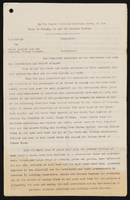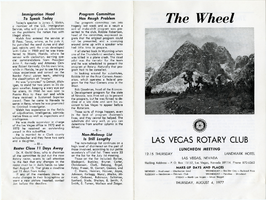Search the Special Collections and Archives Portal
Search Results

Interview with Edward Bonfoy Giller, April 5, 2005
Date
2005-04-05
Archival Collection
Description
Narrator affiliation: U.S. Air Force General; Director Military Application, Atomic Energy Commission
Text

Interview with Roger Ray, October 29, 2005
Date
2005-10-29
Archival Collection
Description
Narrator affiliation: Deputy Manager, Nevada Test Site; DOE Marshall Islands; Colonel. U.S. Army
Text

Interview with Elmer Jesse Sowder, April 29, 2004
Date
2004-04-29
Archival Collection
Description
Narrator affiliation: Test Director, Los Alamos National Laboratory
Text

Interview with John Shannon Coogan, September 15, 2006
Date
2006-09-15
Archival Collection
Description
Narrator affiliation: Health Physicist, Reynolds Electrical and Engineering Company (REECo), Public Health Service (USPHS), Environmental Protection Agency (EPA)
Text

Interview with Anna (Anne) Welsh, June 23, 2004
Date
2004-06-23
Archival Collection
Description
Narrator affiliation: Protester, Nevada Desert Experience
Text

Notice of lawsuit: District Court
Date
1905-06
Archival Collection
Description
This folder is from "Legal Records" file of the Sadie and Hampton George Papers (MS-00434)
Text

Report, Flood control and soil conservation in southern Nevada
Date
1938 to 1950
Archival Collection
Description
Brief history of flooding along the Virgin River and a list of work undertaken to prevent or diminish future flooding.
Text

"This Bud's for You": article draft by Roosevelt Fitzgerald
Date
1980 (year approximate) to 1995 (year approximate)
Archival Collection
Description
From the Roosevelt Fitzgerald Professional Papers (MS-01082) -- Drafts for the Las Vegas Sentinel Voice file. The author's Mother's Day tribute to his mother, Miss Had.
Text

The Wheel Las Vegas Rotary Club newsletter, August 4, 1977
Date
1977-08-04
Archival Collection
Description
Newsletter issued by the Las Vegas Rotary Club
Text
Pagination
Refine my results
Content Type
Creator or Contributor
Subject
Archival Collection
Digital Project
Resource Type
Year
Material Type
Place
Language
Records Classification

